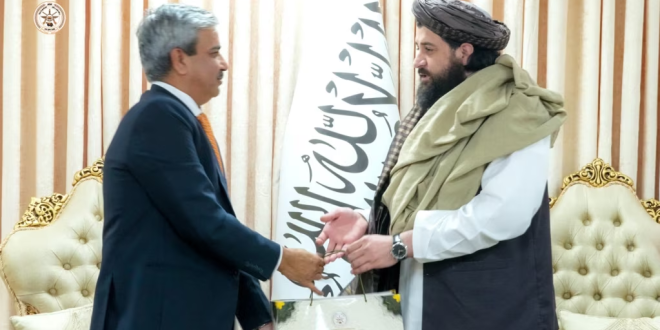KABUL – Taliban leadership hosted a rare set of talks with Indian officials, marking a notable engagement aimed at strengthening bilateral ties and addressing humanitarian needs. The discussions, held from November 4-5 in Kabul, were led by Jitender Pal Singh, India’s key envoy for Afghan affairs, and involved Taliban Foreign Minister Amir Khan Muttaqi, with a groundbreaking meeting with Taliban Defense Minister Mohammad Yaqoob.
The Indian delegation underscored the importance of humanitarian assistance as the core agenda of the discussions, according to Indian Foreign Ministry spokesperson Randhir Jaiswal. In addition to Afghan officials, Singh’s team met with representatives from various United Nations agencies stationed in Kabul.
The Taliban released a statement emphasizing a shared interest in deepening bilateral relations and enhancing the ease of trade between the two countries. Talks also explored access for Afghan traders to the Indian-operated Chabahar port in Iran, a vital link to expand trade for the landlocked nation.
Muttaqi highlighted a desire for strengthened political and economic ties, as well as enhanced visa access for Afghan businesspeople. Singh responded by acknowledging the “historic importance” of India-Afghanistan relations and committed to facilitating visa processes for Afghan nationals.
This engagement between India and the Taliban is expected to raise concerns in neighboring Pakistan, where tensions with Kabul have risen over accusations that the Taliban harbor anti-Pakistani militants involved in attacks on Pakistani forces and civilians. The Taliban have rejected these allegations, asserting Afghanistan’s neutrality and pledging not to allow its territory to be used against other nations.
While New Delhi has re-established its low-level diplomatic mission in Kabul, the international community remains cautious, withholding formal recognition of the Taliban due to ongoing human rights concerns, particularly regarding Afghan women’s access to education and employment.
This meeting marks a cautious but significant step in India’s approach toward Afghanistan since the Taliban regained control in 2021, potentially impacting regional dynamics amid Afghanistan’s continued isolation on the global stage.
 Afghanistan Times
Afghanistan Times




